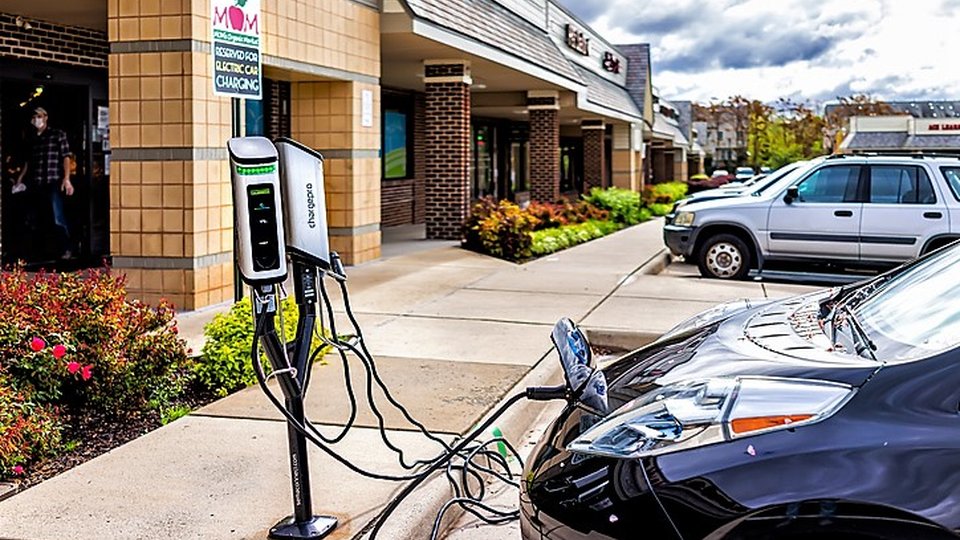Transportation
EV charging station expansion continues despite the pandemic
EV vehicles have expanded steadily over the past decade, and research indicates the coronavirus hasn't taken the wind out of this sector, even as automotive buying has stalled. EV charging offers a rising opportunity for the kiosk industry.

September 2, 2020 by Elliot Maras — Editor, Kiosk Marketplace & Vending Times
Much of the kiosk industry's R&D funding of late has targeted temperature checking and identity verification technology on account of the coronavirus pandemic that has muzzled much of the nation's business activity.
Another vertical not to be overlooked in these changing times, however, is electric vehicle charging stations. EV vehicles have expanded steadily over the past decade, and research indicates the coronavirus hasn't taken the wind out of this sector, even as automotive buying has stalled.
"The consumers are ready to start buying them," Michael Boehm, vice president of business affairs, MOEV Inc., an EV charger technology provider, told Kiosk Marketplace.
By mid-decade, General Motors Corp. plans to sell a million EVs per year in North America and China, according to the company's 2019 sustainability report.
Public EV charging hits a milestone
The public EV charging industry hit a milestone in May when the number of public chargers worldwide surpassed the 1 million mark, a doubling in the past three years, according to Bloomberg. Most of the new infrastructure is in China and Europe, where governments have provided more support, but the U.S. is expected to pick up pace as EVs continue to proliferate.
Level 2 and 3 EV chargers offer faster charging than the Level 1 units that can be plugged into a standard electrical outlet.
As demand increases for Levels 2 and 3 EV charging stations, kiosk manufacturers and operators will encounter more opportunities to serve this expanding industry. In addition to the public EV charging stations that EV vehicle manufacturers are developing, retailers and commercial property owners — many of which already deploy self-service technology — are investing in EV charging stations.
Several kiosk providers interviewed at random said existing customers have inquired about EV chargers.
"I have noticed in the past three weeks that requests for this have really picked up," Chuck Lewis, vice president of Palmer Digital Group, a kiosk manufacturer that has developed EV charging kiosks, told this website last week. In the past year, Palmer Digital Group has been approached by retail chains, quick-serve restaurants, municipalities, movie theaters, casinos and content management system providers.
Palmer Digital Group will be providing an EV charger for Samsung's executive briefing center in Irvine, California, which the company uses to showcase cutting edge technology.
Meridian, another kiosk manufacturer, has also been approached by organizations interested in installing EV charging stations, said Melissa Hayward, marketing manager.
Both Lewis and Hayward said cost has been an issue for these companies and organizations. Long-term, however, both agreed the current obstacles can and will be overcome, as both companies have developed EV charging equipment.
COVID-19 doesn't stop the growth
COVID-19, which delivered an unprecedented one-third drop in global car sales (9 million cars) this year compared to the prior year, has not slowed the growth of EVs, according to the Paris based International Energy Agency.
The IEA expects global EV sales this year to slightly exceed 2019's total to reach more than 2.3 million, a record share of more than 3% of the overall car market. This will bring the total number of electric cars on the road worldwide to a new record of about 10 million, around 1% of the global car stock.
How governments respond to the pandemic will influence the pace of the transition to electric vehicles, according to the IEA.
The continued focus on reducing greenhouse gas emission encourages government at all levels to develop EV charging stations, IEA noted in a recent report. In July, for instance, Florida Gov. Ron DeSantis announced $8.6 million to expand the state's EV stations by 50%.
EVs are among the "green" initiatives gaining visibility during the U.S. presidential election. Presidential contender Joe Biden's "Build Back Better" plan calls for 500,000 EV charging stations, as well as support for jobs in the EV charging infrastructure.
Charging networks expand
EV charging networks, meanwhile, continue to expand in the U.S.
ChargePoint, the world's largest EV charging network, and NATSO, which represents America's travel plazas and truck stops, created a National Highway Charging Collaborative to extend EV charging to every corner of the nation. Over the next decade, the project will leverage $1 billion to deploy charging at more than 4,000 travel plazas and fuel stops that serve highway travelers and rural communities.
The partners also plan to build more than 2,700 fast charging plugs over the next five years, targeting multi-unit residential properties, retail outlets and high traffic areas.
Obstacles remain
Obstacles to public chargers remain, however.
For commercial properties, complications exist, said Boehm of MOEV Inc.
Multi-family buildings, which house around half of California's population, have difficulty installing chargers since uniform business models have not been established, Boehm said.
The property owner does not always believe they should pay for the power.
In addition, some homeowner associations oppose having common electricity sources for personal use.
Infrastructure continues to grow
Solutions to these issues won't resolve themselves overnight, but progress continues.
Some California employers are offering free charging as an employee benefit, Boehm said. If they want to charge employees for the service, MOEV's software sends a report to the employer who then bills the employee. If they want to charge visitors, MOEV places a kiosk that allows the visitor to enter their information and identifies what charger port they used.
Public chargers require credit card acceptance, Boehm said, which is where POS kiosks come in.
"There is essentially a kiosk associated with the charger, which will have a touchscreen usually," Boehm said. "It'll process the payment for your charging session. It may capture your smartphone number or your email so it can tell you when the charging is completed." MOEV builds its own kiosk at the present time.
Like most people involved in the EV industry, Boehm is optimisitc.
"They (consumers) seem to like them (EVs) very much, and with the federal government and state government rebates for buying the vehicle, they're quite happy with the price," Boehm said. A car buyer will get from $500 to $1,500 for EV charging equipment for their home, he said, while a commercial property will get a rebate for most of the cost of the charger.
Meanwhile, more charging infrastructure is needed for California to reach its goal of 2 million EVs, he said.
"You need to have a fair amount of charging infrastructure in order to support those 600,000 (current EVs in California, which accounts for half of the U.S. total) growing to 2 million cars," he said.
About Elliot Maras
Elliot Maras is the editor of Kiosk Marketplace and Vending Times. He brings three decades covering unattended retail and commercial foodservice.
Included In This Story
Palmer Digital Group
Palmer Digital Group specializes in indoor and outdoor digital kiosks and kiosk enclosures. Palmer Digital Group leverages 40 plus years of digital enclosure fabrication capabilities from its highly reputable parent company IEC. PDG manufactures digital kiosk solutions for virtually any industry from QSR to retail to transportation.
 ChatGPT
ChatGPT Grok
Grok Perplexity
Perplexity Claude
Claude










